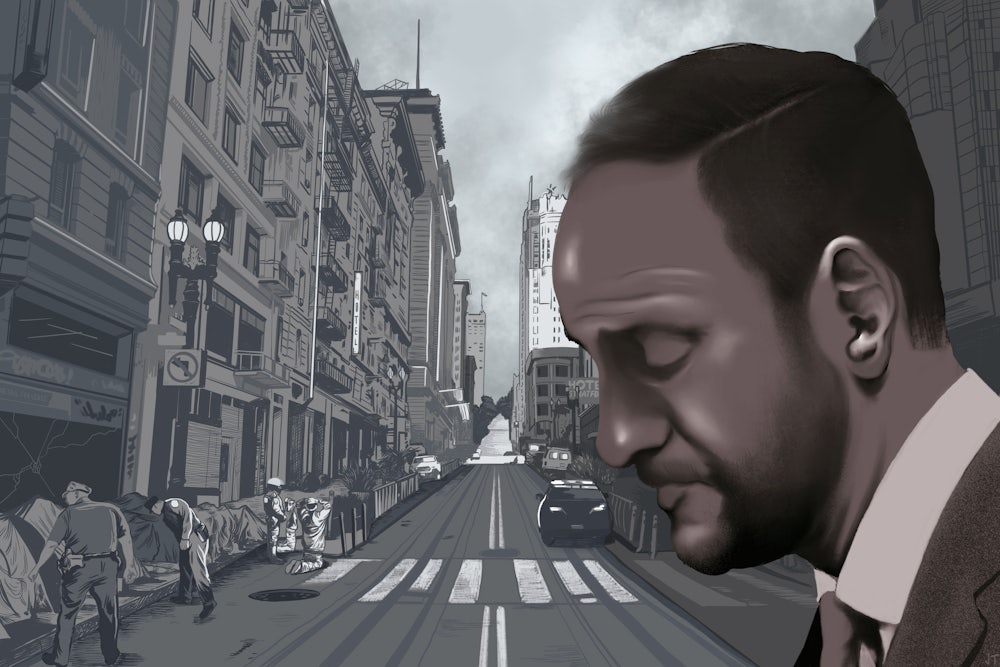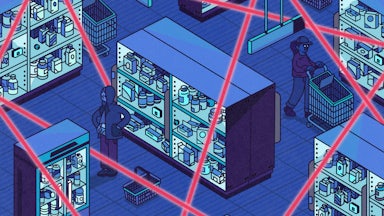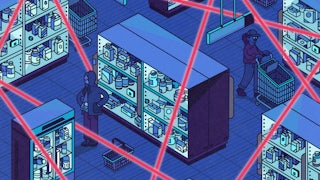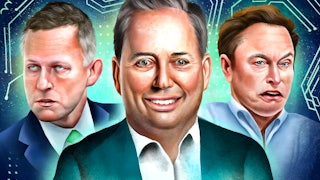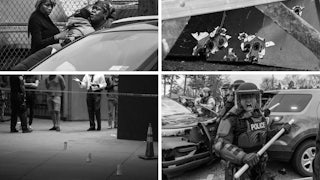San Francisco was in meltdown, and the district attorney had lost control. That was the story that ousted Chesa Boudin, the city’s progressive prosecutor: Get rid of Boudin and San Franciscans will be safer. Now, a few months out from a successful recall, how is the city faring? What was behind the campaign to demolish the former district attorney—and, crucially, who was bankrolling it? On episode 57 of The Politics of Everything, hosts Laura Marsh and Alex Pareene discuss the flaws in the narrative used to unseat Boudin and what has happened since his departure. Guests include Peter Calloway, a public defender who lives in San Francisco’s Tenderloin neighborhood; California journalist Gil Duran; and Jacob Silverman, who wrote about David Sacks, one of the backers of the recall, for The New Republic.
NBC announcer [news clip]: “We begin with the local recall election that’s getting so much national attention: the effort to unseat San Francisco district attorney Chesa Boudin. This is Proposition H. Yes on H means recalling the D.A. No on H? Keep him in office. And tonight, you can see the result is resounding: Boudin is out.”
Laura Marsh: In June this year, the San Franciso D.A. Chesa Boudin was removed after a recall election.
Alex Pareene: His opponents pointed to rising crime in San Francisco and argued that his approach as a prosecutor was making the city unsafe.
Laura: In a piece in The Atlantic celebrating the recall, the writer Nellie Bowles said crime was so bad that “one time someone smashed our windows just to steal a scarf.”
Alex: A former venture capitalist named Michelle Tandler claimed dogs in the city were becoming addicted to meth-laced poop.
Laura: Five months since the recall, we wanted to take a closer look at what really happened. Now that a new D.A. is in place, has crime in San Francisco gone down?
Alex: And we’ll be talking about some of Boudin’s most vocal opponents, including a Silicon Valley mogul, and why they wanted him out. I’m Alex Pareene.
Laura: And I’m Laura Marsh.
Alex: This is The Politics of Everything.
Laura: The recall of Chesa Boudin, who served as San Francisco D.A. for two and a half years, is usually explained like this: Crime was soaring in San Francisco. Boudin wasn’t doing enough to fight it. The recall hinged on the idea that San Francisco was in meltdown and the D.A. had lost control. But the statistics about crime during that period might tell a different story. We’re talking now with Peter Calloway. He’s a public defender, and he lives in the Tenderloin, a part of San Francisco that’s been the focus of fears of crime. He wrote before the recall that almost everything you read about this subject is wrong. Peter, thanks for joining us.
Peter Calloway: Thanks so much for having me. I’m a fan of the show, and it’s nice to be here.
Laura: There was a lot of talk in the lead-up to the recall about how crime rates were going up in San Francisco. What kinds of statistics were Boudin’s opponents throwing around?
Peter: They weren’t so much throwing around statistics as they were just making unsupported claims. There was a general theme that San Francisco had sort of entered a period of lawlessness; the police were no longer arresting people because they knew Boudin would not file charges.
Laura: So the idea is that people were committing crimes and he wasn’t prosecuting them. Were they saying he was doing this with violent crimes, or were they talking about petty shoplifting? What kind of stories were they invoking?
Peter: You saw it in both spheres. There was a version of this claim that was more general and didn’t really get into the specifics. There’s a version that pointed to theft, and I think another version that pointed to, for example, an increase in attacks against the AAPI community, anti-Asian violence generally, and suggested that crime was rising and Boudin was failing to prosecute it. Both those claims are demonstrably false.
Alex: As you say, a lot of the claims that were made were anecdotal or based on sensational viral videos, more on vibe than fact. But you did single out a Washington Post story that claimed murder and rape are up by double-digit percentages in San Francisco. Can you tell us about that story and what their numbers said?
Peter: What the reporter wrote was that crime in the Tenderloin, which by all accounts is the epicenter of the drug and homelessness crises in San Francisco, had in some categories increased by double-digit percentages. And the use of that phrase seems obviously kind of intended to—
Alex: Invoke a crime wave.
Peter: Yeah, exactly right. So that was the sort of trigger for me that caused me to, just after work one night, dig into the San Francisco Police Department data. I’m not really a spreadsheet guy. I actually had to get a little help from an intern about setting up some of the formulas. I looked at crime in every single category and then did year-over-year changes from 2019 to 2020, 2020 to 2021, and then the two-year change from 2019 to 2021. What I found was that this double-digit percentage increase in homicides, for example, that he wrote about was an increase in the number of homicides from 10 to 11. He’s right, it’s 10 percent, but it’s dramatically misleading. Pointing out this misleading use is of course not to minimize the harms represented by even those single-digit increases. My grandfather was murdered when my father was 15 years old, and that changed the trajectory of his life and that of his siblings and family. I’ve seen that up close.
Alex: It’s not to minimize the seriousness of crime to make the point that you can frame a single-digit increase in incidents a double-digit increase in percentages, and how you choose to frame that makes a big difference when you’re telling the story of what San Francisco is like.
Peter: Exactly right.
Alex: And if you’re using crime stats to tell a story, it seems important to me that no one’s really making a compelling causal argument that the actions of a prosecutor, what they choose to charge, actually have a causal effect in the amount of violence in a community.
Peter: It’s interesting to hear you characterize it that way. There’s a study, done in the last year or so, and I think it’s preliminary and hasn’t yet been peer-reviewed but showed no connection whatsoever between the policies of a progressive prosecutor and this—looked at D.A.s across the country and the incidents of the crimes that we think of as within the purview of a prosecutor or a police officer.
Laura: So we’ve talked about the kind of caricature of Chesa Boudin’s approach to his work as the D.A. Can you just describe for us what he was trying to do and what kinds of policies he was pursuing?
Peter: He understood the root causes of crime and the ineffectiveness of these status quo responses and created different responses. Though he charged at basically the same rate. He charged—in fact, I think he had a higher charging rate for sexual assault, for rape specifically, than any D.A. in that office since 2011. His charging rates for other crimes, thefts and things of that sort, were either equal to, just below, or just higher than the D.A. who came before him.
Laura: And tell us about his record of going after white-collar crime.
Peter: Another piece, I think, is a focus on economic crimes and a focus on workers’ rights: the sorts of things that push people in San Francisco onto the streets and cause them to become my clients. So there I’m referring to, for example, his lawsuits against DoorDash for misclassifying its workers as contract. He did the same thing with a company called Handy.
Laura: How widespread is that kind of crime? How many victims are we talking about?
Peter: This is a stunning statistic, but wage theft in the United States, the dollar value is about $50 billion annually, which is far more than all of the other types of theft, larceny, burglary, robbery, combined.
Laura: Right, and yet in the last couple of years, whenever you’ve read something in a major newspaper lamenting the state of San Francisco, it isn’t people walking the streets and saying, “Oh, so many people must be having their wages stolen from them by employers.” They’re talking about this perception of crime happening on the street. They’re not interested in the crimes that they can’t see or that don’t directly affect them.
Peter Calloway: Yeah, I think that’s right. I think also the media bears some responsibility for the crimes that are most front of mind. You could find somebody who’s been displaced, is on the streets of San Francisco, who had been victim of an economic crime by a tech corporation, and help people understand that story a bit more. One other kind of core feature of Boudin as prosecutor that I think is really important is his insistence on holding police accountable for the harms that they create. Between that and the focus on economic crimes, I think the reaction to his tenure is somewhat unsurprising, given the way that we’ve seen those same interests react to challenges to their power and to their privilege throughout the course of history.
Laura: So you live in San Francisco, and you work as a public defender. The portrayal of San Francisco as a place that is full of crime, I mean, how does that square with your day-to-day experience living and working there?
Peter Calloway: There’s no denying the existence of some of these problems, and I live, again, in the Tenderloin, which is sort of the epicenter of the homelessness and drug crises. I see people suffering. My experience of San Francisco is that despite these conditions in some areas, statistically it’s among the safest major cities in the United States. Our homicide rate is the lowest among the top eight or nine cities of its size.
Laura: So what you have is a prosecutor who is tough on crime. He’s tough on corporations. He’s tough on police who commit crime. But he is portrayed as being soft on crime because a lot of his opponents didn’t want those kinds of crimes investigated.
Peter: Yeah, I mean, when people say tough on crime, they mean this very specific thing—and it’s not the thing that they claim to mean.
Alex: Peter, thank you so much for talking to us.
Peter: Thank you so much for having me. I really enjoyed it.
Laura: The recall was successful in that it got Boudin removed. But its stated goal was to lower crime in San Francisco—and that part is a different story.
Alex: After the break, we’ll talk about what happened after Boudin was ousted.
Alex: His detractors may have called him soft on crime, but Chesa Boudin charged at similar rates as his predecessors. He had a different idea about which kinds of crime matter most. He went after companies, and he went after the police. But after he was recalled, the mayor of San Francisco, London Breed, appointed Brooke Jenkins to replace Boudin as district attorney. Jenkins was a “tough on crime selection.” We’re talking now with California journalist and former political adviser Gil Duran, about what happened next. Gil, thanks for joining us.
Gil Duran: Thanks for having me.
Alex: What was Brooke Jenkins’s background exactly, and what kind of promises was she making?
Gil: Brooke Jenkins was an assistant district attorney working for Chesa Boudin in the D.A.’s office and quit in a very dramatic fashion last October to become his chief critic in the recall campaign. When she quit, she quit because she said that he had mishandled a murder case that she had been working on. What the actual reality was, was that they did get a conviction, but the person who did the murder was obviously very mentally ill and so the jury found for insanity. Jenkins wanted to fight the insanity plea, even though the guy’s probably going to spend the rest of his life in a locked mental hospital, and so she leaves with that rationale, becomes [Boudin’s] chief critic, and throughout the campaign pretty much asserts that the crime and the disorder and the lack of safety that some people feel was a direct result of Boudin’s politics and his tone or vibe. Lo and behold, she ends up becoming, after the recall succeeds, his successor. Now multiple sources told me that other candidates had turned down the position, but the mayor’s office swears that she was the first choice. In any case, she is now in the hot seat as San Francisco’s interim D.A.
Alex: I guess just to get to the pretty obvious question: She has now been the D.A. for a little while, the interim D.A. What kind of progress has she made? Are things better in San Francisco? Has the crime wave receded? Has the chaos ended?
Gil: In short, no. The disorder, the open-air drug dealing that largely drove the Boudin recall, have continued unabated. We’ve seen property crimes, drug crimes, and even murders continue to take place—surprise, surprise—in a big urban city with a lot of inequality, a lot of poverty, and a lot of problems.
Alex: So what has she done? What’s her record been so far?
Gil: Mostly it’s consisted of very bold declarations of harsh new policies. She says she’s going to prosecute more juveniles as adults. She’s restarting the drug war, promising to arrest and jail both drug users and drug dealers, which is probably not going to be too successful because the jail is at capacity because it’s completely understaffed. She’s also making it unclear as to whether she’s going to prosecute police officers who are accused of abuse; she’s got to keep the police union in her corner. They were the chief antagonist to her predecessor. So what we’ve seen is a lot of big promises that she’s gonna somehow reverse or banish from existence crime using a return to policies that actually did not work for decades when California had a 30-to-40-year tough-on-crime period starting in the 1970s with Jerry Brown, my former boss, for whom I worked both in the city of Oakland when he was mayor and in the governor’s office. When you get to the end of the tough-on-crime rainbow, you find that reform is necessary because prisons and jails are creating more crime. She seems to be recreating what we already did in the ’70s, ’80s, and ’90s and promising it’ll be different this time, at a time when we’re actually at a period where crime is much much lower now than it was in the ’80s under Mayor Feinstein, who everybody regards as a great mayor, who is certainly not soft on crime, or under D.A. Kamala Harris, or Mayor Gavin Newsom, who are regarded as very effective politicians, but if you look at their crime rates, they would’ve done anything to have crime be as low as it was during the time that Chesa Boudin was in office.
Alex: Yeah, I mean, from my perspective, there’s something similar in the politics here in New York, where the Republicans will run on a return to tough-on-crime, and then you go back to the Giuliani era or the Governor Pataki era, and the crime rates then were astronomically higher than they are now. We went over the statistics already, and it seems like these statistics almost matter less for a lot of people than a general atmosphere. It seems really hard for the data to make a difference in how people perceive what’s going on in a place like San Francisco.
Gil: Yeah, this was really a case of mass hysteria, as far as I could tell. It felt sometimes like being in an experiment, where you’re seeing whether this sense of panic can drive Democratic voters to behave almost as Republicans and to disregard the facts and the statistics for a general feeling that things were unsafe no matter what the facts said. And I think a big mistake that people like Brooke Jenkins are making is they’re really accepting this Republican frame that prisons and incarceration and harsh penalties solve crime. There is no evidence of that happening in the United States. It didn’t work in California when we tried it for 35 years. And so it’s not clear where San Francisco thinks it’s going by repeating the broken policies of the past, when during the era of reform, we’ve experienced some of the overall lowest crime rates in recent history.
Laura: We want to talk about some of what’s driving those perceptions of rising crime regardless. You wrote this great piece for the San Francisco Examiner titled “Cocaine buffets and meth poop. Meet Twitter’s rising anti–San Francisco influencers.” Can you talk us through some of the ways this kind of information is spreading?
Gil: Sure. I think there’s a concerted effort to push this narrative, both in terms of public people, the police unions, Republicans—there are a few here in San Francisco pushing the crime narrative, blaming Boudin—but you also had a lot of sock-puppet accounts, some bots and troll networks that are identified all pushing this idea of crime. Added to that you have television news, which is a parasite that feeds on crime and disorder and pushes it to people every day as if it’s the only thing happening in town. I think all of these things together conspired with millions of dollars in money from Republican-leaning billionaires who put all of this angst and fear behind a campaign to scapegoat Boudin for all of the problems in our town. So you really saw this convergence of different factions into a focused effort on Chesa Boudin.
Alex: I wanted to get to some of the goofier examples of that, though, because I think that the—was it fentanyl in the dog poop, or was it meth?
Gil: It was meth in the fentanyl, and the dogs were allegedly—this was false—getting addicted to eating the poop or hunting out the meth poop in parks, and everyone was doing it. But anything like that you can just make up and it becomes sticky.
Alex: So it seems sort of obvious why the right, and we’re going to get into the billionaire aspect a little bit more with our next guest, but it seems obvious why the right would target a so-called progressive prosecutor. San Francisco and California are very Democratic places. Is it the case that Democrats, the Democratic Party, prominent Democratic elected officials, were they behind Boudin? How did the party react to this recall campaign?
Gil: The thing about Boudin that also helped with his demise is he’s a bit of an outsider here. He beat a progressive Democrat who was part of what you call the city family. He also has this radical background that was easy to take shots at. His parents were in the Weather Underground. He worked for Hugo Chávez down in Venezuela as a translator. It was very easy to make him into this leftist monster who was destroying the town. He didn’t have the governor coming to his aid. He didn’t have the mayor coming to his aid; she was happy to have someone else be the scapegoat, because mostly during my time in City Hall in L.A. and Oakland, the mayor gets blamed for crime, not the D.A. The mayor jumps on the police chief. The chief jumps on the command staff. The command staff jumps on the sergeants. The sergeants jump on the officers, and everybody has to go out there and make arrests. Boudin was kind of on his own. So it wasn’t that they were supportive of it necessarily, but everybody just stood back and watched it happen.
Alex: You can see how if you’re London Breed the argument is, “Well, this is someone it won’t hurt me if this person goes down.” But that person went down and then now what? As you say now, there’s no Boudin to point the finger at. That seems shortsighted.
Gil: Oh, well, “Now there’s no simple answer to crime. It’s very complex and complicated, and we need time to figure it out.” Now the whole rationale has shifted. The thing is, as someone who worked for people like Jerry Brown, Diane Feinstein, Kamala Harris, and others, the politicians here are so amateur they’re not even trying to hide how amateur they are. There is no grand theory at play here. This is absolute flying blind into the fog, and I don’t think they even realized the degree to—how we arrived at reform was trying tough on crime, and you’re not going to get much smarter than Jerry Brown. He was tough on crime. We were tough on crime in Oakland, and then we get to Sacramento and what do we do? The largest prison reform in the history of the country. Because that’s what you learn being tough on crime is that the only moral solution—the only effective solution is to reduce the prison population and change how we deal with the situation.
Laura: It sounds like the right lesson was learned there, but what do you think will be the legacy of this recall?
Gil: I think that from now on in San Francisco, the D.A. is going to be a lot more in the hot seat. Somehow we redefined it so the D.A. is now responsible directly for crime. Although, in a recent L.A. Times profile, Brooke Jenkins said something to the effect of, “We can’t prosecute our way out of this problem”—which sounded a lot like Chesa Boudin!
Laura: Right.
Alex: Now you tell us.
Gil: My prediction is that she will be Chesa Boudin, and she’ll realize that this is the situation you have. Because, I mean, I’ve been on campaigns—you promise all this stuff, then you get in the office, like, holy crap, there are all these problems, obstacles, rules, things you can do, things you can’t do, so it’s not as easy as giving a speech. I think the legacy of it will be that the D.A. will get a lot more scrutiny going forward. But I also think some interesting things have turned up in the polls that have been conducted here over the past few months, which is that people are conflating homelessness and disorder and mental illness on the streets with crime. The fact that we are statistically much safer from violent crime than we’ve ever been in recent history doesn’t matter as much. I think the real problem that Democrats in California are responsible for and have to face is, why do so many people live on our streets? To me, that’s not a problem you solve with jails, though that is what some people are proposing. It’s a problem you have to solve with housing and with care and with empathy. When you do the research here and you look at what people like Brooke Jenkins are proposing, it’s really infuriating because it’s all the broken stuff that doesn’t work. Most voters fell for this line, and I think they’re gonna be sorely disappointed. Then the question is gonna be what do we really do, and, again, there’s no path forward that doesn’t lead you back to the very reforms that got Chesa Boudin crucified in San Francisco. By the way, he didn’t even do those reforms. That was Jerry Brown. That was Gavin Newsom. People act like Boudin did those reforms. I was a part of those reforms. I had more to do with them than Boudin did. He was in Venezuela or somewhere. And the voters voted for these things. We supported these things. So what was scary to me is how you could really channel that kind of public anger at somebody who had nothing to do with it. But again, he wasn’t a great politician. He was too honest. Another legacy of Chesa Boudin’s recall: Don’t be too honest. Kind of lie. It’s working for Jenkins. She’s lying her way to victory today.
Alex: All right. Well, great advice. If you’re listening, that’s great advice for any politicians listening at home.
Gil: They already know.
Alex: Gil, thank you so much for that edifying conversation.
Gil: Thank you.
Laura: After the break, we’ll look into who was behind Boudin’s recall. The backers of the recall campaign wanted him out. But they may have had a bigger political project too.
Laura: We’ve been talking about the way crime in San Francisco appeared in the media and how those stories played with voters and with other Democrats. But this is also a story about a few individuals who invested heavily in removing Boudin from his position. The recall campaign raised $7 million, more than double the amount Boudin’s supporters raised. One of Boudin’s earliest and most vocal opponents was the Silicon Valley investor David O. Sacks. He called Boudin “the killer D.A.” and told The Megyn Kelly Show he thought Boudin was to blame for “chaos and lawlessness” in San Francisco. At one point in the campaign, nearly one-third of all donations against Boudin came from him. We’re talking now with Jacob Silverman about David O. Sacks’s involvement in the recall and his larger political agenda. Jacob, thanks for joining us.
Jacob Silverman: Thanks for having me. Glad to be here.
Laura: David O. Sacks is a fascinating figure. He’s connected to a lot of other powerful figures in Silicon Valley who are also increasingly politically active. Can you tell us a bit about him?
Jacob: Sure. Right now I suppose you’d call him a member of the PayPal Mafia, as it’s pretty widely known.
Laura: OK, and just remind us: What is the PayPal Mafia?
Jacob: It’s basically the core early employees of PayPal—who were all men—and the most well known of whom are Elon Musk, Peter Thiel, and, as I argue, David Sacks. And you’ve got companies like YouTube and many others that came out of there and the whole Musk and Thiel empires. They’ve all gone on mostly to huge amounts of wealth and a lot of influence in the Valley. But Sacks’s association with these folks goes back to Stanford in the early ’90s, where he met Peter Thiel, Keith Rabois, and some other folks who would be early PayPal employees at Stanford. A lot of them wrote for or worked on the Stanford Review, which was the conservative publication that Thiel founded. Basically it was an era where they were doing a lot of the same culture warring that we see today, but at the time, what they were worried about was issues of multiculturalism—that was the big bogeyman, that word specifically—and diversity in general. If you look at their writings then and the battles they’re having then compared to now, it’s a lot of the same issues, with a lot of the same crude talking points.
Laura: Right. The way I knew of Sacks from that period was that he was actually the co-author of a book with Peter Thiel called The Diversity Myth. And just for our listeners, they weren’t advocating for diversity. This wasn’t like a group of people who were drawing attention to like, “Oh, there’s like rape on campus. This is something we should do something about.” They were the backlash to people who were making those arguments.
Jacob: Very much so. They were part of this conservative counterreaction or backlash at Stanford that was, in part, people were sick of hearing about the ’60s from their professors. It was early ’90s, Clinton era. It was just its turn, I suppose, for conservative counterrevolution, and they were doing things like testing the bounds of free speech by yelling at people with bigoted slurs and stuff like that. There was an issue of the Stanford Review called “The Rape Issue.” But in general there was this disgust with what they saw around them which was lots of efforts at diversity inclusion. There would be ethnic affinity halls on campus, a lot of cultural-based campus organizations, things like that. They thought everything was being divided among racial lines and it was sort of like, “Oh, the anti-racists have become the real racists” thing that you hear now.
Laura: It’s funny because the way that we mostly know of these figures now is that they are investors, CEOs. Thiel founded several successful companies, but most notably PayPal. David O. Sacks was the CEO of Zenefits, which kind of blew up in a crazy way a few years ago. They’re known as business figures, but really they were activists from the beginning, and they continue to be politically active. There’s kind of a straight line between those campus cultural war days and what David Sacks has been doing in San Francisco.
Jacob: When some of the comments, especially about rape in The Diversity Myth appeared, they disavowed them. They said, “Oh, those are just impetuous thoughts of my youth.” But look, we could argue about whether they still believe these things, but they were political animals from the beginning and they were very preternaturally aware of how to operate within political milieus. And so Sacks and Thiel were co-writers from an early age in college. They wrote pieces for Wall Street Journal and National Review and other political publications. Their book was sponsored by the Independent Institute, which was a libertarian think tank. They were well connected from the beginning, and so I’d say that the business has been pretty good for both of them. And of course PayPal was the core of that. But the politics have always been there. I think what you see more in recent years is that the ideology probably has been pretty consistent, but in terms of inserting himself more into the public sphere and having a more perhaps coherent though still murky, I’d say, political program, and being willing to donate money and be loud about it—that’s where Sacks is at now and where things have changed. Thiel is a little bit of a quieter figure, but he’s certainly been a force for years politically.
Alex: On the one hand, anytime you look into the history of reaction and the history of the right in this country, it’s dispiriting how reliably it can be traced back to the hangups of college Republicans on elite college campuses. We just can’t get away from that.
Jacob: It’s crazy. From Buckley to Thiel.
Alex: It’s just a story that repeats itself over and over again. But from what you’re describing, it seems like there was this little bit of these guys making their money and then now in this political environment, for a variety of reasons, deciding to let the mask slip, and after being apolitical for a while, reverting back to the reactionary politics they were forged in and being much more open about pursuing them.
Jacob: Yeah. I think you certainly saw that earlier with Thiel and his support of Trump and his writings basically against democracy and women’s suffrage. Someone like Sacks donated to Hilary Clinton and some mainstream Democrats, but what basically has happened in the last few years, is that they’ve given up on, I’d argue, democratic governance, probably with a big D and small d. And San Francisco is the core of that— the emblem of everything that’s failed in urban governments in America. They don’t necessarily have a positive economic or policy program, but they are willing to spend a lot of money on recalls and on reactionary figures. So that’s what brings us to today is that people like Sacks and him in particular: Every major recall that’s happened either in the Bay Area or recall attempt, or statewide, he’s put money into all of those.
Alex: How much money are we talking for Sacks in this one recall for Boudin?
Jacob: It’s mid-to-high five figures. There are other people like William Oberndorf, who is a billionaire, who put in more. But I would argue two things. One, you don’t know, as actually Boudin himself said in an interview, you don’t always know where the money is going with some of these organizations. Sacks certainly was very influential in terms of the sheer dollar-to-dollar but also the role he played of bringing tech people into this and being a propagandizer against Boudin.
Laura: Why do you think he focused on Boudin so much? I mean, he wrote this piece calling him “the killer D.A.” on Medium. Why Boudin? Why pick that fight?
Jacob: I think he cares about San Francisco because he lives there and one of his at least three mansions is there. He’s been there a long time. And I think also he is just rather draconian law and order, seemingly, in his politics, and he doesn’t like what he sees from the criminal justice reform movement. I’ve seen interviews where he’s barely paid lip service to it, like, “Oh, maybe people shouldn’t be arrested for smoking weed,” or something like that. But he is part of this trend, I’d say, both legally and culturally, to criminalize homelessness and to see homelessness as synonymous with crime, even though a lot of homeless people are crime victims. So Boudin was a ripe target. They had some success with the school board recall, which he put money into. The Newsom recall did not work, but he put money into that too. He’s willing to take his swings, and I think Boudin was a good target with this alliance of billionaire developers and tech people who were disgusted with what they saw. In his own telling, he thinks that Boudin was basically more sympathetic to criminals than to crime victims. He’s pretty unequivocal about that.
Alex: Something I find interesting about this political moment—because I have this feeling that they are meddling in San Francisco because they think of it as their fiefdom to an extent and they should be able to control what’s going on there—but these are the sorts of people, people with these backgrounds, who for much of my adult life we would have described as being libertarian. They would have been promoting anti-government, John Galt-y, Randian libertarianism—that was the flavor of Silicon Valley giving for so many years. But it seems like the new style is pretty straight up law-and-order authoritarianism. I would say that seems like a shift, but I don’t know how much of a shift it actually turned out to be.
Jacob: Yeah, I think there are a couple things going on there. One is just day-to-day stuff, what they see—like, “Look, there are a lot of homeless people around the Twitter offices and open-air drug use.” But I think some of these people have also realized it doesn’t take necessarily a lot of money to buy an election. Like Sacks himself, he gave $1 million to J.D. Vance, to his PAC, but he can afford it. The stuff in San Francisco, he has probably donated in the hundreds of thousands of dollars collectively, I would think, so you can get something for your money there, and yeah, I think in the end they also are just not interested in noncarceral solutions to this stuff.
Alex: You get rich enough, your attitude just becomes, “I can pay to make this thing that I don’t like go away.”
Jacob: Yeah.
Laura: A lot of his contributions have been focused in California. Do you think that the recall of Boudin and the success that that campaign had heralds more activity like this on a national level? What do you think is next for Sacks and the group of like-minded activists?
Jacob: I do. I think a couple things are going to happen. One, I ended my article with a quote from him saying, “This model needs to be replicated across the country.”
Laura: That’s a direct quote.
Jacob: Yeah. I think [it] somewhat depends on their commitment. Thiel has recently said that “we’re a little too negative. We don’t really have a positive program.” Big surprise, they need that. They need some positive program. But they all seem to like DeSantis as the more respectable alternative perhaps to Trumpism. During the elections or as votes were being counted, Sacks basically posted some stuff about DeSantis, “Proud of his reelection. It’s time for DeSantis in 2024.” I think … what you’re gonna see is both an attempt to roll back criminal justice reform, recall who they can just by using their money, and then [push] their crew. I mean, some of them lost, like Oz, who they’ve raised money for, and Blake Masters—
Laura: Another Thiel co-author.
Jacob: Yeah, another Thiel employee. But J.D. Vance, they’re gonna push their guys who made it in. Then I think DeSantis is going to be their stalking horse who they’ll try to assemble behind for 2024.
Laura: Thanks so much, Jacob.
Jacob: Sure thing. Glad to do it.
